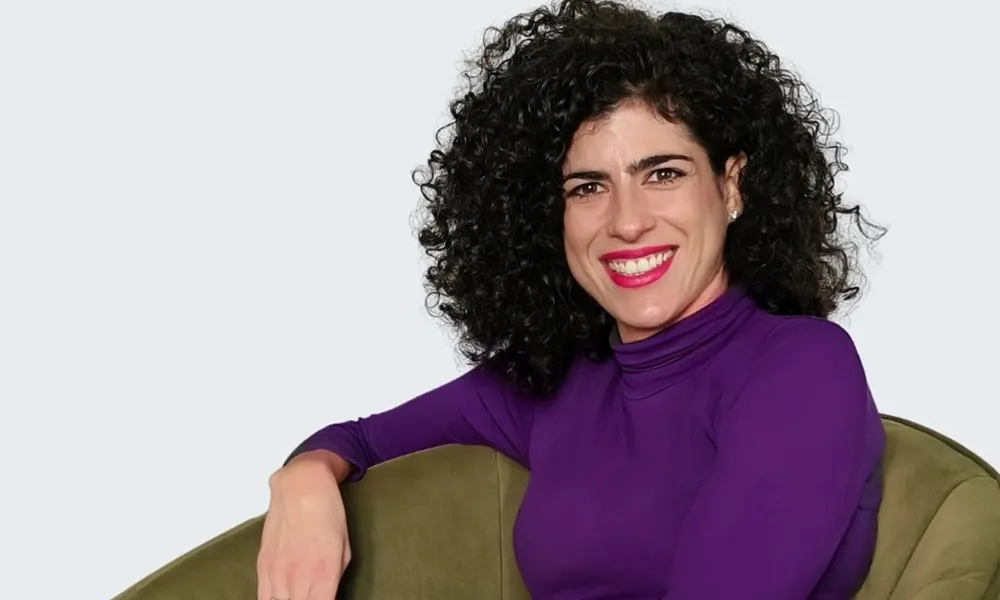This feature is part of Politis to the Point’s ongoing series amplifying women’s voices ahead of Cyprus’s parliamentary elections in May 2026. With the island still ranking lowest in the EU for women’s representation, the series challenges political parties to move beyond promises and token gestures toward real structural change and equality.
Andromachi Sophocleous has been a determined voice for change since the beginning of her public life. A graduate of political philosophy and theory, she has spent the past years working as a consultant on domestic and international political affairs, with a focus on the rise of the far right, energy developments in the Eastern Mediterranean, and the Cyprus problem.
She is also co-producer of Nicosia Uncut, a podcast on the Island Talks platform, Cyprus’ first trilingual podcast space, and an active presence in movements for reunification, human rights, and environmental protection. Today, she is the Co-President of Volt Cyprus, a party that has woven gender equality into its constitutional fabric and seeks to redefine how politics is done on the island.
“In Volt, we walk the talk,” she says. “Gender-balanced leadership is literally written into our constitution, from the presidency to the political council. I’m co-president alongside Panos Parras, and we have the same rule for the vice-presidents. Out of 21 council members plus the leadership team, there must be at least ten women and ten men. In our 2024 internal elections, 11 women and 10 men were elected. It’s not a quota for show; it’s the way we function.”
Sophocleous believes that the urgency to act for women’s participation in leadership is not something that appears only before elections. “This is not a problem we face in Volt,” she explains. “Gender equality is part of our very purpose. We’re not centered around one leader like traditional parties. Our collective model allows more voices to be heard, and that helps achieve true balance.”
Beyond “women’s issues”
When asked about the frustrations younger women express, that their concerns are often confined to token or “soft” policy areas, Sophocleous is clear.
“I don’t believe in identity politics,” she says. “Politics means turning our values into concrete policies that affect everyone, not just playing with labels. I’m a woman who’s had to fight to be heard, and I want to create room not only for women’s voices but also for women’s perspectives.”
That perspective, she explains, is embedded in Volt’s programme. “Gender equality is mainstreamed across everything we do. High-quality healthcare and childcare, protection of reproductive rights, access to contraception and education, equal opportunities in the workplace, these aren’t ‘women’s issues’. They’re core elements of a prosperous society,” she says.
“How can you discuss reproductive rights unless women are part of policy-making? How can you talk about childcare without including the experience of caregivers? Volt’s mentality and structure make this possible.”
“We aim to do politics differently”
Some critics argue that women’s organisations risk legitimising the very systems that exclude them by working within male-dominated political structures instead of transforming them. Sophocleous’s answer reflects Volt’s European identity.
“From the beginning, Volt said it would do politics differently. Across Volt Europa there are no separate women’s branches. We have a male and a female co-president, and gender equality runs through the entire programme. It’s shared and supported by all members.”
The only exception, she notes, could arise from Cypriot state funding rules that prioritise registered women’s organisations, “but that’s a matter of bureaucratic necessity, not philosophy.”
“What greater message can one send about equality than a woman co-leading a party? When parity exists across all structures, you don’t need a separate branch to prove it.”
The barriers remain
Cyprus continues to rank near the bottom in the EU for women’s parliamentary representation. Asked what lessons could be drawn from countries like Sweden, Finland or France, Sophocleous points to the structural barriers that persist.
“Women’s under-representation isn’t because they lack ability or interest,” she says. “It’s because the system isn’t built to support them. Many women are forced to choose between family and politics. Without affordable childcare, quality healthcare, and fair parental leave, participation becomes almost impossible.”
She also highlights financial and social inequalities that make political careers less accessible. “Women candidates face funding gaps, fewer training opportunities, and smaller networks, often because they simply don’t have time to engage if they’re also raising families. And then there’s the online abuse and intimidation. Women in public life are targeted with sexist attacks and cyber-violence designed to silence them.”
Her own experience, she admits, shaped her awareness of these challenges.
“I was 27 when I first spoke publicly, without any party affiliation, about the need for a solution to the Cyprus problem,” she recalls. “I said that unless we solve it, things will only get worse. I was attacked online and in some media on both sides of the divide. That experience showed me exactly what women face when they enter politics. I can handle it, but not everyone should have to tolerate it. We must create a safer space in politics.”
Despite these obstacles, she sees signs of change. “Through my interactions with younger women, I’m happy to see that Volt’s example is empowering them. They feel represented, and that’s profoundly encouraging.”
